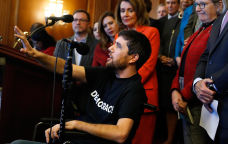What Ilhan Omar Said About AIPAC Was Right; Ilhan Omar Is Not Anti-Semitic. She’s An Anti-Imperialist
What Ilhan Omar Said About AIPAC Was Right - Ady Barkan (The Nation)
Ilhan Omar Is Not Anti-Semitic. She’s An Anti-Imperialist - Raphael Magarik (The Forward)
What Ilhan Omar Said About AIPAC Was Right
I’m ashamed to admit that endorsing AIPAC positions was all about the Benjamins for me and my candidate.
By Ady Barkan
February 12, 2019
The Nation
Over the weekend, Republican House minority leader Kevin McCarthy said he would seek to formally sanction the first two Muslim congresswomen, Ilhan Omar and Rashida Tlaib, because their criticism of Israel’s occupation of Palestine was even more reprehensible than Congressman Steve King’s defense of white supremacy. What motivated McCarthy’s false accusations of anti-Semitism? On Twitter, Omar suggested, “It’s all about the Benjamins baby,” quoting Puff Daddy’s ’90s paean to cash money. Omar subsequently specified that she was talking about spending from the likes of the American Israel Public Affairs Committee, better known as AIPAC, the powerful pro-Israel lobbying organization.
By Monday morning, AIPAC had mobilized its allies to condemn Omar’s comment for playing into centuries-old anti-Semitic tropes that wealthy Jews control the world. Even the Democratic leadership put out a statement condemning her. All because she dared to point out that the emperor has no clothes.
As a Jew, an Israeli citizen, and a professional lobbyist (ahem, activist), I speak from personal experience when I say that AIPAC is tremendously effective, and the lubricant that makes its operation hum is dollar, dollar bills.
In 2006, fresh out of college, I landed a job as the first real staffer on a long-shot Democratic congressional race in deep-red Ohio. My boss, Victoria Wulsin, was a charming hippie doctor with a lefty perspective on international affairs. She was skeptical of military force and opposed to the Israeli occupation of Palestine.
About a month after winning the Democratic primary, we were struggling to gain attention or money. Nobody gave us a chance to win. One political-action organization, however, did reach out to us. It wasn’t Emily’s List, although Vic was fiercely pro-choice. It wasn’t a labor union or even a doctors’ association. It was AIPAC.
A local Democratic volunteer leader of the Cincinnati AIPAC chapter sat down in Vic’s living room and I recall him saying that he would like to raise $5,000 for our campaign and would also like to see Vic take a public stance on two relatively obscure issues relating to Iranian sanctions, arms sales to Israel, or some other such topic that very few voters in the district cared about.
Vic and I both thought of ourselves as pro-peace, not pro-Israel. We both felt icky about doing it; it was too hawkish and too quid pro quo. But we were desperate. So I read the AIPAC position papers that the volunteer left with us, I wrote up a statement saying that Vic supported AIPAC’s stance on its two pet issues of the cycle, she approved it, I posted it online, and the checks promptly arrived in the mail thereafter. We didn’t win, but the money helped us get close.
It was, I am ashamed to say, definitely about the Benjamins. We never would have done it otherwise. AIPAC’s power is about more than money, certainly. It’s about great organizing (they built a local chapter, and sent a local Democratic volunteer emissary who then facilitated the contributions). It’s about diligence (they paid attention to Vic’s campaign long before anyone else, and were happy to donate to both us and the militaristic, pro-Likud Republican incumbent). Their lobbyists on the Hill are the best in the business, and their legislator junkets to the Holy Land are masterfully orchestrated. But money is central to the whole system.
Technically, AIPAC doesn’t make the political contributions. Instead, as it notes proudly on its website, individual members of its “Congressional Club,” like that Cincinnati resident, do the bundling and donating directly, both as individuals and through Political Action Committees that AIPAC and its members have set up.
Omar is right to point all this out. These dynamics are not unique to the Israel-Palestine issue, however, and there is no reason that Americans should be surprised or offended by what she and I are saying. The NRA and the broader gun lobby operate in the same way. Same with ExxonMobil and the fossil-fuel lobby. But since Omar and Tlaib are powerful new spokeswomen for the movement to end the Israeli occupation, delegitimizing them is a central aim of the Israel lobby.
AIPAC and its partners, which include Christian Zionists and military contractors, are a central pillar of the Israeli occupation. Without congressional support, the Likud/anti-Palestine/pro-occupation project would be radically undermined. The money that AIPAC and the rest of the lobby spend is indispensable to that work. That’s why they spend it. Pointing this out is not anti-Semitic.
We do, in fact, have a growing anti-Semitism problem in America. But Omar and Tlaib are not a part of it. They are allies of mine and of Jews across this country who are fighting for peace, racial justice, immigrants’ rights, and the defeat of fascism. The anti-Semites are the Nazis and white supremacists who marched and murdered in Charlottesville, whom Donald Trump called “very fine people,” and the MAGA supporter who massacred worshippers at a Pittsburgh synagogue.
The Israel lobby flexed its muscles in response to Omar’s tweet. Almost all of Capitol Hill, sadly including the Democratic leadership that I have supported, was up in arms. It flexed with equal potency last month in marshaling through the Senate a clearly unconstitutional law to ban speech promoting a boycott of Israel.
For 12 years, I have harbored minor private shame for advising Vic to endorse AIPAC’s position papers and more significant shame for not doing enough to stop the oppression of the Palestinian people.
I am speaking up now because it may be my last chance. Although I am only 35, I am dying. As I write these words, I am sitting with my wife in the waiting room of the Santa Barbara hospital emergency room, slowly bleeding from my stomach into a pile of gauze. I had a feeding tube inserted four days ago but it isn’t healing properly. I am losing the ability to swallow, because I have ALS, a poorly understood neurological disease with no treatment, which seized my body 28 months ago and has basically paralyzed me since. My hands do not work and almost nobody can understand my mumbling, so I am using amazing technology that tracks the location of my eyes and allows me to slowly type out these words with my pupil-tips.
This is my chance to redeem my Jewish guilt, to speak out against the oppression that is being perpetrated in my name, and I do not intend to let a minor obstacle like ALS stop me.
Young Jews across America increasingly agree with Omar and me, and that is making the Israel lobby very nervous. As it should: The occupation is too immoral, illegal, and inhumane to survive an open and honest conversation in the marketplace of ideas. That is why AIPAC and its associates work to silence criticism of Israel by accusing its detractors of anti-Semitism and claiming that nobody may ever talk about how the Israel lobby uses money to build power.
The ugly truth is that the Israel lobby, like other powerful lobbies led by Jew and gentile alike, wields its money strategically and effectively. Outrage should be directed not at those who point this out (most often Muslims and people of color) but at the suffering of the Palestinian people and the simultaneous dependence of the Republican Party on genuine anti-Semites.
I do not expect to live to see the liberation of the Palestinian people. But I maintain hope that my toddler son will. If he does, it will be because young American Jews like him do the honest self-reflection taught by our forebears, take pride in our tradition of justice, and join in solidarity and struggle with fellow Semites like Omar.
[Ady Barkan is an organizer with the Center for Popular Democracy and the founder of the Be A Hero PAC. His memoir, Eyes to the Wind, will be published by Atria Books in the fall.]
Related Article

I’m Dying. Here Is What I Refuse to Accept With Serenity.
Ady Barkan
Copyright c 2018 The Nation. Reprinted with permission. May not be reprinted without permission. Distributed by PARS International Corp
Please support progressive journalism. Get a digital subscription to The Nation for just $9.50!
Ilhan Omar Is Not Anti-Semitic. She’s An Anti-Imperialist.
By Raphael Magarik
February 14, 2019
The Forward

Representative Ilhan Omar
Photograph: Carolyn Kaster/AP // The Guardian
There are two stories this week about Rep. Ilhan Omar, the new Democratic congresswoman from Minnesota. But the trick is, you cannot understand one without the other. Let me explain.
First, she tweeted that Republican attacks on her and Rep. Rashida Tlaib were “all about the Benjamins.” Her suggestion that money heavily influences politicians’ positions on Israel (which is an obvious fact) was widely attacked as anti-Semitic, and she was forced to apologize. That story attracted massive attention — statements from Trump and cable network debates.
Second, on Wednesday, she had a fiery, tense exchange with Elliott Abrams, Trump’s special envoy to Venezuela, over his involvement in atrocities and coups in Latin America in the 1980s. Somehow, I doubt this second story will get the same intensive coverage. And yet it is the far more interesting, surprising story — and without it, we have no chance of understanding the real dynamics of the anti-Semitism charges.
Listen here.
Some background: Trump has picked Abrams to advise him on how to respond to a right-wing coup in Venezuela against the democratically elected, but deeply unsavory, corrupt, and authoritarian Maduro regime. Observers worry that Trump means to back the coup, perhaps even militarily. The choice of Abrams confirms those worries, because in the 1980s, Abrams oversaw brutal, cold-war American colonialism in Latin America: support for the Guatemalan dictator Efrain Rios Montt as he butchered his own people, the cover-up of the El Salvadorian military’s murder of several hundred civilians in El Mozote, and the covert overthrow of the democratically elected Sandinista government in Nicaragua.
For his role in the Iran-Contra Affair, he pled guilty to two misdemeanors.
Elliott Abrams’ continued role in American foreign policy is a shanda, a scandal. But it is a normal scandal. The surprise is Omar’s line of questions — not just about Abram’s criminal record, but about his role in American war crimes.
Even the words she uses to describe American foreign policy is shocking: “Would you support an armed faction within Venezuela that engages in war crimes, crimes against humanity, or genocide,” she asked him, “if you believe they were serving U.S. interests as you did in Guatemala, El Salvador and Nicaragua?”
Such brutal, honest language about American foreign policy is rarely heard in Congress.
It is the language of committed anti-imperialism — of someone who views American foreign policy with sizeable suspicion, who does not assume that our military is virtuous, who is all too aware of the ugly work done by American proxy-states around the world.
Indeed, Omar’s foreign policy platform announces that she will “reduce total spending on the military,” “end sanctions and embargoes against countries” and renegotiate free-trade agreements to stop “multinational corporations exploit working people.”
Moreover, she has attracted the wrath of the Saudi government, who fear she will attack links between the U.S. and Middle Eastern dictatorships. In other words, Omar is well outside the foreign-policy mainstream—in my view refreshingly. She would curtail the projection of American military power abroad, and she thinks America gets in bed with too many bad actors.
This context is crucial for understanding her policy and tweets about Israel, for two reasons.
Narrowly, arguments about supposed anti-Semitism often rest on the claim that critics single out Israel unfairly. There is some truth to this, because for the most part, American politicians do not question most of the horrible things that American money and troops do overseas. (Remember the catastrophic, pointless war in Afghanistan which has claimed more than 60,000 Afghani lives? Exactly one member of congress, Rep. Barbara Lee, voted against it in 2001.)
But it is totally unfair when applied to Omar.
She genuinely holds radical, risky views on all aspects of American foreign policy. She is opposed to violence against civilians in Latin America, in Yemen, and yes, in Gaza too. She believes the United States should end sanctions everywhere — not just against Iran, but against North Korea too. Say what you want about her foreign policy, but she is a peacenik and skeptic of American empire—consistently.
But beyond the question of her consistency, Ilhan Omar’s anti-imperialism is important because it heralds new possibilities in American politics—and a new conversation about Israel and Palestine.
While she is clearly on the left of the Democratic Party, there are reasons to think she is a vanguard, rather than just a fringe. For one thing, Senator Bernie Sanders advocates many of the same policies, albeit more moderately. Further, at the 2016 Democratic convention, his faction pushed the question of the Israeli-Palestinian conflict, long untouchable in U.S. politics.
More broadly, as Dov Waxman observes in his book Trouble in the Tribe, foreign policy in America has recently started to become a partisan issue, rather than a matter of collective consensus. Compared to twenty-five years ago, Republican and Democrat voters differ more sharply and coherently on foreign-policy issues. Space is opening for a foreign-policy Left, a politically viable anti-imperialism that has power within the Democratic Party.
Such anti-imperialists will necessarily be suspicious of AIPAC and of Israel. If you believe in cutting American military spending and reducing our presence abroad, you will hardly favor giving Israel three billion dollars in military aid every year.
If you are appalled by American-backed atrocities in El Mozote, you will likely be equally upset about civilians being mowed down on the Gaza border. If you use the word “occupation” to talk about America’s role in Iraq and Afghanistan, then you will use the same word to talk about the West Bank.
In short, the old rules may no longer apply. Much of the American consensus on Israel has rested on a broader agreement about American power and violence: that we are basically virtuous and good-intentioned.
Debates largely play out within ideologically narrow bounds — arguments between moderates and neo-conservatives over whether this or that intervention is wise, while the military budget slowly grows, the U.S. continues to support dictators and quiet wars, and so on. Debates about Israel remain largely between conciliatory liberal Zionists and rabid right-wingers, with the Left being pushed to the margins.
But things do not have to continue like this, and if the growing polarization of American politics continue, that fundamental consensus will crack. If it does, the argument about Israel and Palestine will shift radically.
Omar may, in short, have caved this time. This particular tweet came to seem indefensible: the pressure was too great. But it cannot continue like that. Her broader vision of America’s role in the world is simply incompatible with funding and arming the Israeli occupation.
Having taken clear, radical positions on American foreign policy, she simply will not be able to be “make nice” every time. And if 2020 is anything like 2018, and this nascent anti-imperialist group grows — well, then, she may not have to.
[Raphael Magarik is a graduate student in English Literature at UC Berkeley. His work has appeared in The Atlantic and The Forward.]


Spread the word